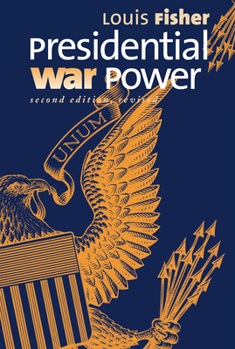Presidential War Power
Select Format
Select Condition 
Book Overview
This edition updates arguments throughout, critiques the presidential actions of William Clinton and George W. Bush, and challenges their dangerous expansion of executive power, covering: new military initiatives including the Use of Force Act, the Iraq Resolution of 2002 and George W. Bush's preemption doctrine.
Format:Paperback
Language:English
ISBN:0700613331
ISBN13:9780700613335
Release Date:May 2004
Publisher:University Press of Kansas
Length:318 Pages
Weight:1.15 lbs.
Dimensions:0.8" x 6.1" x 9.0"
Customer Reviews
3 ratings
Powerful indictment of the modern abuse of the war power
Published by Thriftbooks.com User , 18 years ago
Fisher's book is the strongest demonstration of how far we have allowed the original constitutional design of the war power to be destroyed that I've seen so far. Originally the war power was designed to avoid allowing a single person (i.e. the President) to decide whether we go to war; that was the duty of Congress. Fisher documents this fact and then examines two hundred years of American armed conflicts. Until the early 20th Century, with only minor deviations, it was understood that the President had to get authorization from Congress before entering armed conflicts. Only after WWII did the President claim the sole power to go to war, with Congress simply along for the ride. Fisher is nonpartisan in his criticism, attacking every President from Truman to Bush II, though he is supportive of Eisenhower's limited return to Congressional consultation. Fisher explains how practically every military action taking in this period was unconstitutional. What I like most about this book is the fact that Fisher, unlike many other critics of this problem, does not seek to push the Supreme Court to intervene and restrain the President. Instead, he places the burden upon Congress. Fisher examines attempts to constrain presidential power, such as the War Powers Act, and illustrates that each has been insufficient and offers proposed changes to improve these checks. An interesting and informative read and we can only hope that someday Congress will again take up its responsibility rather than hide behind the President and then blame him if things go badly.
Congress' Critic
Published by Thriftbooks.com User , 23 years ago
Although some background in constitutional law may be helpful, this book is very readable. Fisher is a thorough scholar, but he is also honest in giving vent to his frustration with Congress' cessation of war power in the modern evolution of Executive-Legislative relations.This book is a great resource for historical and anecdotal information on the constitutional balance of power between the President and the Congress. Well-cited, and with a firm basis in constitutional logic and theory, Fisher develops a clear case that -although it does take on a diatribal flavor at times- does not require academic contortions to be demonstrated. The criticism of the War Powers Act is very powerful, and needs to be understood more broadly in America. The unconstitutionality of the act is one reason it is never seriously invoked by the President or insisted upon by Congress, yet many people still refer to it as the crux for understanding the war powers balance between the Presidency and the Congress.An excellent book for anyone interested in Constitutional allocation of power; useful for students, professors, and the concerned citizen.
Congress Good, President Bad
Published by Thriftbooks.com User , 23 years ago
Constitutional scholar Louis Fisher has done a magnificent job capturing the history of what he calls "presidential warmaking" -- that is, the tendency of presidents to usurp Congress's Constitutional war-making power. Fisher is not persuaded by claims advanced by modern presidents -- Democrats and Republicans alike -- that the Commander-in-Chief clause grants them broad discretionary war-making powers. His book is a long legal brief in favor of returning the war powers to the Congress.At times, Fisher's belief in the rightness of his cause borders on the polemic. Though he recognizes that Congress has been complicit in presidential war-making, he reserves his harshest criticism for the presidents themselves. Arguably, however, it takes two to tango; if Congress actually *wanted* the war powers, it could take them "back." But as research shows, it is easier -- and therefore more palatable -- to sit on the sidelines, sniping at the president in case of failure or claiming a share of the credit after success.No student of American politics or American foreign policy can plausibly claim to discuss the role of the executive branch in military/foreign policy without having digested Fisher's book.






